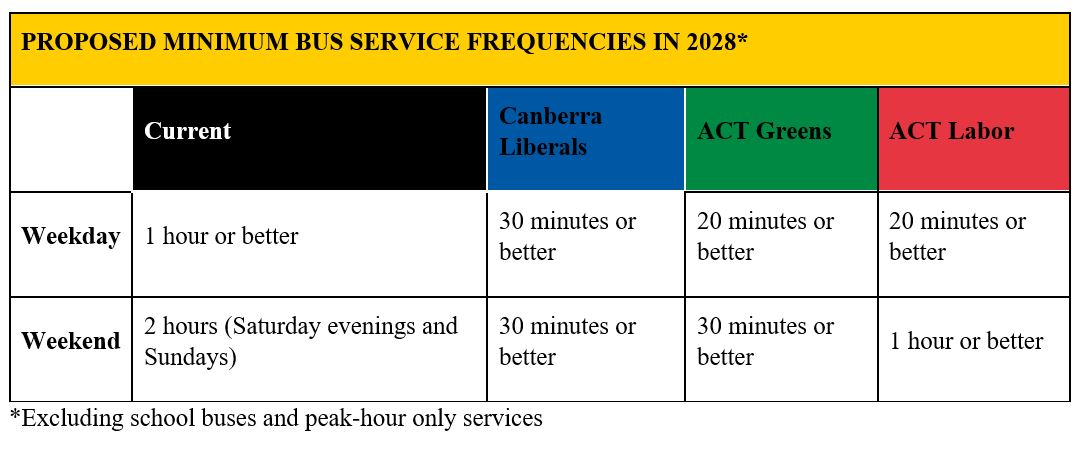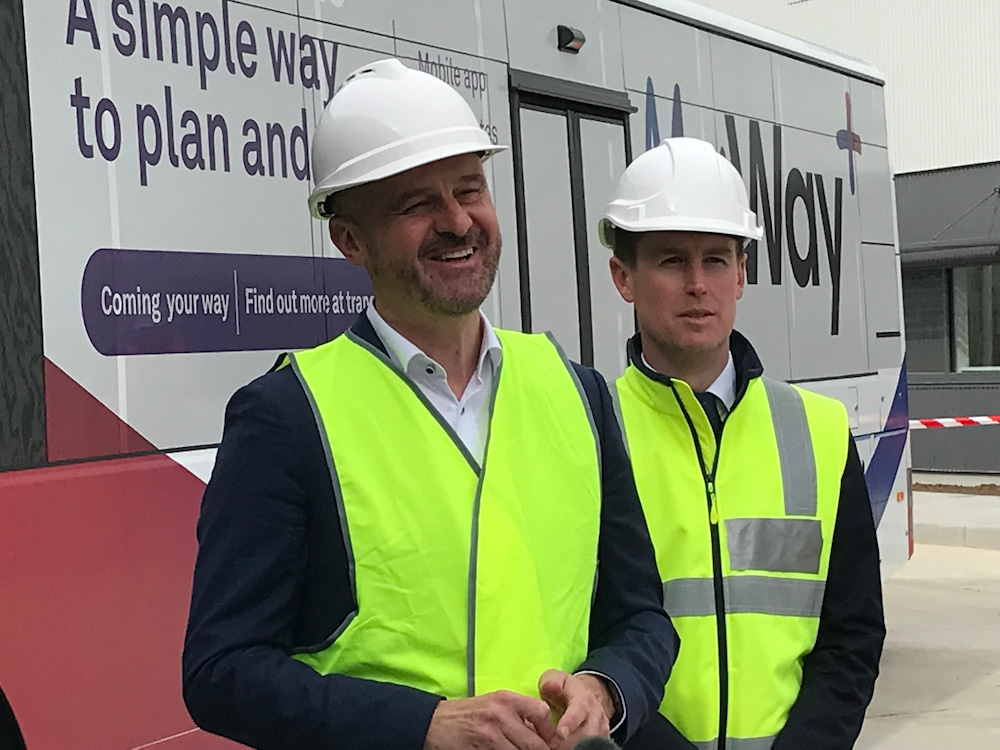“This election is not a contest between buses or light rail; we need to do both,” Chief Minister Andrew Barr said this morning, announcing ACT Labor’s public transport policy.
And Labor, Mr Barr says, is the only party in this campaign that will deliver both.
“We’re going to invest in light rail, in electrifying and expanding the bus fleet, infrastructure to support charging and recharging of those buses, and to improve the operation of the network,” Mr Barr said.
Extending light rail to Woden
Labor promises to build light rail from Civic to Woden (stage 2), establishing a north-south mass-transit line that will connect employment, residential, and commercial hubs, transport minister Chris Steel has said.
Stage 2A (Civic to Commonwealth Park) would be operational in 2028; the government has already signed the construction contract.
Stage 2B is likely to be finished in 2033, Mr Barr said last year. However, the Chief Minister said today, the ACT Government is working with the Federal Government on planning approvals and design.
The ACT Government argues that light rail is necessary to avoid traffic congestion as Canberra’s population grows to 620,000 by 2046, and that the environmentally friendly system would lower greenhouse gas emissions.
However, light rail has been controversial. An independently published report, 21st Century Public Transport Solutions for Canberra, published in February, warned that the government should not proceed light rail stage 2B – an enormous expense to service less than 10 per cent of Canberra’s commuting public – and instead adopt electric buses or a trackless tram system.
The Canberra Liberals claim that light rail stage 2 will be an “economic disaster”, costing more than $5 billion ($1.46 billion for stage 2A and north of $4 billion for stage 2B), and have committed to stop light rail at Commonwealth Park.
The ACT Government has been cagey about how much the project would cost; Mr Barr explained today that they would not prematurely announce how much they were prepared to pay while the procurement process was underway, to avoid ‘conditioning the market’.
Mr Barr, however, emphasised Labor’s co-funding partnership with the Federal Government: each will pay for half of 2A, while the Commonwealth has provided $50 million for stage 2B.
Shadow transport minister Mark Parton MLA, however, says it is debatable whether light rail to Woden would be delivered by 2033. According to the Liberals, the government will be $18 million in debt at the end of the forward estimates, not counting any expenses for stage 2B.
“Canberra cannot afford and does not need stage 2B of light rail from Civic to Woden,” Bill Stefaniak, Belco Party spokesman and co-convenor, said. “Indeed, I call on all the other independents to commit to cancelling stage 2B so we can fund our hospitals, police and other essential services. This is a vanity project of Shane Rattenbury and his Green colleagues. We do not need it and cannot afford it.
“It’s probably too late to cancel stage 2A and thus save the Canberra community $10 billion or more that can be spent on hospitals, the health system, the extra 250 police we need immediately, and the 300 more we will need in the next few years, not to mention money to keep our city and suburbs neat and tidy. Electric buses to Woden will be a tenth of the cost and be twice as quick as light rail.”
Independent candidate Fiona Carrick called for a transparent business case – which the ACT Auditor-General has said the government did not provide – “to assess the best option for our different public transport needs and the associated cost so we can be properly informed.”
“Many want more transparency around the costs and timelines for the roll-out of light rail,” Independents for Canberra’s leader Thomas Emerson said. “Some worry the project is bankrupting the territory. Others want it delivered faster. Pointed questions need to be asked about why it’s taking so long, whether the exorbitant cost of the project is a consequence of the same supplier being used for every new stage without ever returning to market, and what impact cost blow-outs are having on other spending priorities like social housing.”
More zero emissions buses
The government intends to make zero emissions buses one-third of its fleet, replacing replacing diesel and compressed natural gas buses with electric ones. Today’s announcement included an $80 million package to buy 110 more electric buses over the next four years – more than any other party had promised, Mr Steel said. The ACT Government has already bought 106 buses, of which 23 have been delivered.
Mr Parton, however, said “Mr Steel’s claim that 110 is a greater addition than any other party is simply wrong”. The Canberra Liberals would procure 500 new electric buses over the next decade; the ACT Greens have promised to grow the fleet to 550 buses, with 100 new electric buses. Mr Parton considers Labor’s policy “to some extent, a ‘me-too’ of the Canberra Liberals’ transport plan”.
Mr Emerson observed that this year’s ACT budget showed fewer electric buses would be delivered in 2024-25 than last year’s budget promised.
“It will be interesting to see if the reduced target is met,” he said. “In the 2012 election campaign, ACT Labor committed to increase public transport commuting to 10.5 per cent of trips by 2016 and 16 per cent by 2026. The rate dropped 0.6 per cent in the decade after they made that promise, to 6 per cent.”
Faster and more frequent services
Labor promised to introduce three new rapid bus services from Civic to Tuggeranong, West Belconnen (Ginninderry), and the Molonglo Valley.
They would also increase local services to 20 minutes on weekdays – “a significant step-up in services,” Mr Steel said.
While the rapid services would run half-hourly on weekends, local services would only run hourly, which many consider too slow.
The Public Transport Association of Canberra said it welcomed both the rapid bus routes and buses leaving every 20 minutes, but urged Labor to match the Canberra Liberals and the ACT Greens’ promise of bus services every half-hour on weekends.

“Passengers want more frequent weekend buses,” PTCBR chair Ryan Hemsley said. “As soon as Saturday bus services increased to hourly running earlier this year, patronage increased by more than 20 per cent.
“Canberra is a modern city with people living full lives every day of the week. We need to move away from old-fashioned attitudes towards weekend public transport service.
“The best way to get Canberrans onto buses is to make them frequent, reliable, and convenient. A boost to our Saturday and Sunday bus frequencies is long overdue, and will provide our city with the level of public transport service we deserve.”
Greens transport spokeswoman Jo Clay MLA said: “Without our similar announcement four months ago, there’s no way Labor would have come out at this election promising to make suburban buses more frequent. With Labor in charge of buses, people in the community have been forced to plan their whole day around a service that is just too infrequent.”
Fiona Carrick did not think Labor’s proposed bus frequency adequate.
“We need great public transport now, which means we need frequent services that take us to where we need to go in a reasonable time,” she said. “The commitment to run local services every 20 minutes on weekdays by the end of the next term is not an election commitment to improve frequency this term, and does not address poor services frequency on weekends. One journey services to the city to reduce the requirement to change buses has not been addressed.”
Labor’s other bus policies
Labor would be the only party to employ transport officers as “a visible presence on both buses and interchanges to improve safety for those using public transport and to reduce occupational violence for drivers”, Mr Steel said.
Labor would recruit 350 new bus drivers and install a bus priority lane on the Belconnen Transitway between Belconnen and Civic.
The ACT Greens said they had promised bus lanes for the City and Molonglo, as well as for Belconnen. Ms Clay said that because good public transport helped people in the cost-of-living crisis, the Greens would make it free for people aged under 18 and for people on low incomes with concession or pension cards to ride buses and light rail; and extend discounts for full-time tertiary students to part-time students.
Will Labor deliver?
The policy was launched at the Woden electric bus dépôt, which will be the largest in Australia when it opens at the end of the year. It is, Mr Barr and Mr Steel say, a sign of Labor’s commitment to public transport: the depot will be capable of charging around 100 electric buses at a time. Modifications to the capital’s other depots mean that the ACT will have the capacity to charge 300 buses.
Labor’s policy builds on infrastructure investments including augmenting the electricity grid and establishing Australia’s first TAFE Electric Vehicle Centre of Excellence to train workers, the ministers said.
Mark Parton, however, does not believe that Labor will deliver on its plan; Labor, he says, has “a track record, over a long period of time, of failing in the public transport space”. For instance, he noted, Mr Barr announced before the 2020 election that light rail would be in Woden by 2025; the new MyWay+ ticketing system was supposed to be rolled out earlier this term, rather than at the end of this year; Woden bus dépôt was supposed to open in 2022; and only 23 of the 106 electric buses are on the roads.
Mr Parton wondered why, if electrifying the bus fleet was a priority, Labor had not budgeted for it, rather than rolling it out as an election policy.
Likewise, Bill Stefaniak asked: “Labor has been in power for 23 years. Why have they not done this before? We get all these promises just before every election, and nothing ever seems to happen.”
Other independent parties were also sceptical of Labor’s promises.
“How much stock should we put in election commitments?” Mr Emerson said. “Many people in our community are asking if the promise of an integrated public transport system, with equitable access for all Canberrans, is an ever-receding mirage. …
“We’re hearing that people want a cross bench of independents forcing ongoing accountability from our government, interrogating these kinds of plans and keeping the governing party honest.”
Peter Strong (Strong Independents) said: “This policy announcement is another sign of the government’s panic. The government promised to provide a business case for the light rail extensions, and so far, nothing – there is also no business case for this current plan.
“The Strong Independents would create an Independent Infrastructure Commission to check all government business cases and costings – an independent opinion is needed, and only a strong cross bench will deliver that. For example, if the business case was endorsed by the new commissioner, then we could have electric buses on the road faster than the four years planned by Labor. The biggest contributor to emissions in the ACT are vehicles, and we can impact on that faster.
“We note that the Chief Minister stated that ‘This election is not a contest between buses or light rail. We need to do both.’ It should be noted that the government hasn’t done that after 23 years. So why would we trust them to do it now? Our experience is that most people do not believe anything the government says – with good reason.
“The chances of this plan by the government happening is zero, they have lost their way and need to go away.”



